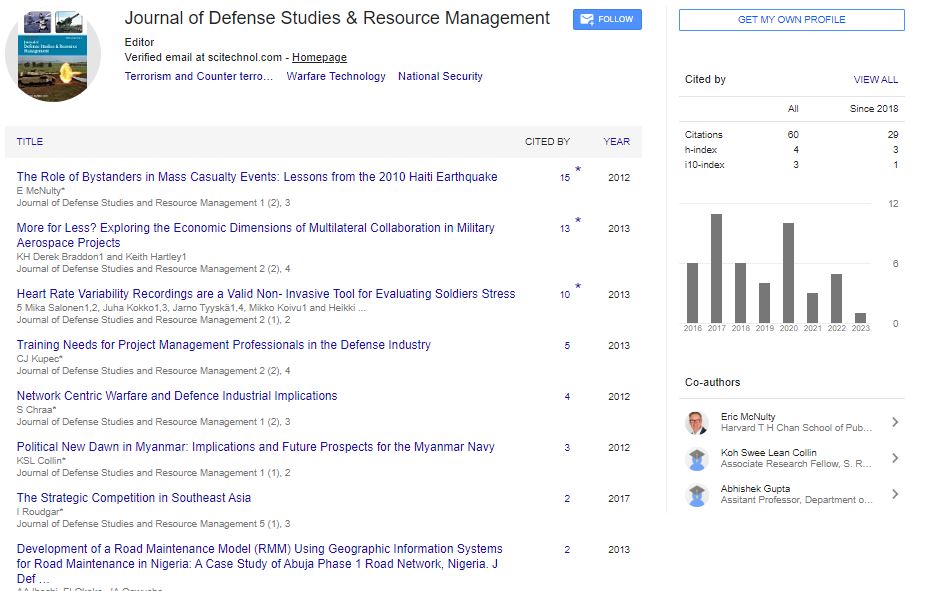Commentary, J Def Stud Resour Manage Vol: 11 Issue: 2
Exploring the Significance of NH-1 in India's Defense Mechanism
Madhav singh Chaddha*
1Department of International Relations and Area Studies, Institute for Defence Studies and Analyses, New Delhi, India
*Corresponding Author: Madhav singh Chaddha,
Department of International
Relations and Area Studies, Institute for Defence Studies and Analyses, New
Delhi, India
E-mail: chaddha77@gmail.com
Received date: 29 May, 2023, Manuscript No. JDSRM-23-107159;
Editor assigned date: 31 May, 2023, PreQC No. JDSRM-23-107159(PQ);
Reviewed date: 14 June, 2023, QC No. JDSRM-23-107159;
Revised date: 22 June, 2023, Manuscript No. JDSRM-23-107159(R);
Published date: 29 June, 2023, DOI: 10.4172/2324-9315.1000180
Citation: Chaddha SM (2023) Exploring the Significance of NH-1 in India's Defence Mechanism. J Def Stud Resour Manage 11:2.
Abstract
Description
National Highway 1 (NH-1) holds immense strategic importance as a crucial transport artery for India's defense tactics. Stretching over 1,450 kilometers, NH-1 connects the nation's capital, Delhi, with the border regions of Jammu and Kashmir. This article explores the significance of NH-1 in India's defense strategy, analyzing its role in troop deployment, logistics, mobility, and reinforcement capabilities, and highlighting its contribution to national security.
Strategic mobility and troop deployment
NH-1 serves as a vital lifeline for the rapid mobilization and deployment of Indian armed forces to the sensitive border regions of Jammu and Kashmir. As a major highway, it facilitates the swift movement of troops, equipment, and supplies, enabling the timely reinforcement of military units in response to emerging security threats or conflicts. The well-maintained and broad highway infrastructure of NH-1 ensures smooth transportation, reducing response time and enhancing the military's ability to maintain an effective presence in the region.
Logistics and supply chain resilience
The uninterrupted flow of supplies and logistics is essential for sustained military operations. NH-1 plays a crucial role in maintaining the supply chain and ensuring a continuous provision of essential resources to the armed forces stationed in Jammu and Kashmir. It serves as the primary conduit for transporting fuel, ammunition, rations, and equipment to the border areas, enhancing the resilience and operational readiness of the military units deployed in the region.
Strategic depth and reinforcement
NH-1 offers strategic depth to Indian defense tactics by providing a secure and reliable transportation network. In times of crisis or conflict, the highway allows for the swift deployment of reinforcements from the hinterland to the border areas. This strategic depth acts as a deterrent, signaling India's ability to swiftly reinforce its defensive posture and effectively respond to any hostile actions along the border.
Civil-military coordination
NH-1 also facilitates effective civil-military coordination in times of emergencies or natural disasters. The highway acts as a vital channel for the timely movement of disaster response teams, relief supplies, and medical aid to affected regions. This coordination between civil agencies and the military not only ensures effective disaster management but also strengthens the overall resilience of the nation's defense infrastructure.
Challenges and mitigation measures
While NH-1 plays a crucial role in India's defense strategy, it faces challenges that need to be addressed. The highway passes through rugged terrain and high-altitude areas prone to inclement weather conditions. This necessitates continuous maintenance and resiliencebuilding measures to ensure all-weather connectivity. Additionally, the threat of terrorist activities and cross-border infiltration in the Jammu and Kashmir region requires enhanced security measures and constant vigilance along NH-1.
Conclusion
National Highway 1 is a vital artery of India's defense tactics, serving as a lifeline for strategic mobility, troop deployment, logistics, and reinforcement capabilities in the sensitive border regions of Jammu and Kashmir. It plays a crucial role in maintaining operational readiness, enabling effective civil-military coordination, and bolstering national security. Given its significance, continuous investment in infrastructure development, robust maintenance, and security measures is essential to ensure the uninterrupted functioning and resilience of NH-1, further enhancing India's defense capabilities in the region.
 Spanish
Spanish  Chinese
Chinese  Russian
Russian  German
German  French
French  Japanese
Japanese  Portuguese
Portuguese  Hindi
Hindi 